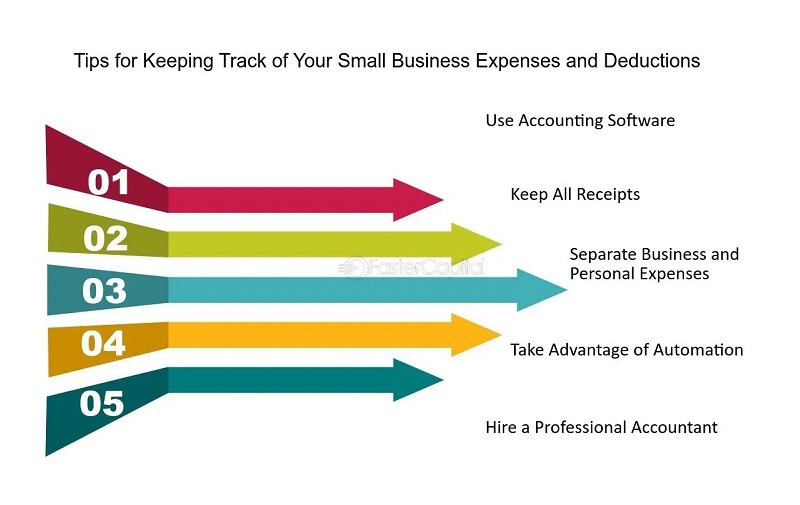
From Beginner to Balance Sheet Boss: Your Crash Course to Financial Confidence
April 3, 2024
Unlock Your Business Potential: The Ultimate Guide to Creating Financial Statements
April 17, 2024Demystifying Tax Write-Offs for Small Businesses
Ever felt overwhelmed by tax season as a small business owner? While taxes can be a complex beast, there’s a silver lining: tax write-offs. These deductions allow you to subtract certain business expenses from your taxable income, effectively reducing your tax bill.
In simpler terms, for every dollar you spend on a qualifying business expense, you’ll owe less in taxes. This can be a significant financial boost for small businesses, especially in the crucial early stages.
Here, we’ll break down the concept of tax write-offs for small businesses and explore the 7 Top Tax Write-Offs you can leverage to optimize your tax savings.
What are Tax Write-Offs for Small Businesses?
Tax write-offs, also known as business deductions, are expenses that you can legally subtract from your gross income when filing your taxes. This lowers your taxable income, which translates to a smaller tax burden.
Here’s a simplified example:
Imagine your gross income (total revenue) is $50,000 and your qualified business expenses total $20,000. By claiming these write-offs, your taxable income becomes $30,000, leading to a significantly lower tax liability.
For small businesses, maximizing tax write-offs is crucial for financial health and growth. Let’s delve into the 7 Top Tax Write-Offs you can utilize to keep more of your hard-earned money.
7 Top Tax Write-Offs for Small Businesses
-
Home Office Deduction: If you dedicate a space in your home exclusively for business purposes, you might qualify to deduct a portion of your rent, mortgage interest, utilities, and internet expenses.
-
Business Vehicle Expenses: The miles you drive for business purposes can be deducted using the standard mileage rate or by tracking actual expenses (gas, maintenance, repairs).
-
Business Meals and Entertainment: While there are limitations, some business meals and entertainment costs can be partially deducted if they have a clear business purpose.
-
Business Interest and Bank Fees: Interest paid on business loans and credit cards is generally deductible. However, there are exceptions, so proper record-keeping is essential.
-
Business Insurance: Premiums paid for necessary business insurance policies can be deducted as a business expense.
-
Continuing Education: Educational expenses that help you maintain or improve your skills relevant to your business can be tax-deductible.
-
Startup Costs: Certain expenses incurred while launching your business, like legal and professional fees, might be eligible for tax write-offs. However, limitations and specific rules apply.
Optimizing Your Tax Savings with Strategic Write-Offs
Now that you’re familiar with the 7 Top Tax Write-Offs, let’s explore how to strategically leverage them to maximize your tax savings.
Maximizing the Home Office Deduction
The home office deduction allows you to deduct a portion of your home expenses if you have a dedicated space used regularly and exclusively for business.
Here’s how to optimize your home office deduction:
- Deducting Beyond Rent/Mortgage: Utilities, internet, and even homeowner’s insurance (for the business portion) can be included in the deduction.
- Record-Keeping is Key: Maintain detailed records of home office square footage, total home expenses, and how you calculated the deduction (simplified vs. regular method).
Remember: The IRS has specific requirements for claiming the home office deduction. Consult a tax professional if unsure about eligibility.
Smart Strategies for Business Vehicle Deductions
There are two main ways to deduct business vehicle expenses:
- Standard Mileage Rate: This simplified method allows you to deduct a set amount per mile driven for business purposes (established annually by the IRS).
- Actual Expense Method: Track all your vehicle expenses (gas, repairs, insurance) and deduct a portion based on the percentage of business use.
Choosing the Right Method:
- The standard mileage rate is generally simpler, but the actual expense method might be more beneficial if you incur high business mileage or significant vehicle expenses.
Maintaining Mileage Logs:
- Regardless of the method chosen, meticulous record-keeping is crucial. Keep a mileage log documenting business trips, dates, destinations, and purposes.
Business Meals and Entertainment: Walking the Tightrope
Business meals and entertainment can be partially deducted, but there are strict limitations:
- Clear Business Purpose: The meal or entertainment must have a legitimate business purpose, like client meetings or fostering business relationships.
- 50% Deduction Limit: Only 50% of the qualifying expenses are deductible.
Documenting Business Purpose:
- Maintain detailed records for business meals, including attendees, purpose, and cost.
- Business receipts are crucial for substantiating your deductions.
Remember: Lavish or extravagant meals generally don’t qualify for deductions.
Unlocking Hidden Deductions in Business Interest and Bank Fees
Interest paid on business loans and credit cards used for legitimate business purposes is generally deductible.
Here’s how to optimize your deductions:
- Distinguish Business vs. Personal: Only interest on loans used exclusively for business qualifies for deduction.
- Maintain Clear Records: Separate business and personal bank accounts and credit cards to simplify record-keeping.
Not all interest is deductible: Interest on personal loans or credit cards used for business purposes generally isn’t deductible.

Optimizing Your Business Insurance Deductions
Premiums paid for necessary business insurance policies (liability, property, workers’ compensation) are deductible business expenses.
Here are some tips for optimizing your deductions:
- Tailoring Coverage: Ensure your insurance coverage aligns with your business needs to maximize deductible premiums.
- Understanding Non-Deductible Premiums: Life insurance premiums, for example, are generally not deductible as a business expense.
Remember: Consult your insurance broker to ensure your chosen coverage qualifies for tax deductions.
Continuing Education: Invest in Yourself, Reduce Your Tax Bill
Educational expenses that help you maintain or improve your skills relevant to your business can be tax-deductible.
Here’s how to make the most of this write-off:
- Qualifying Courses: Courses related to your industry, software training, or professional certifications might be deductible.
- Substantiating Relevance: Maintain documentation linking the course to your business and how it enhances your skills.
Not all education qualifies: Expenses for personal development or hobbies generally aren’t deductible.
Strategic Use of Startup Cost Deductions
Certain expenses incurred while launching your business might be eligible for tax write-offs. However, limitations and specific rules apply.
Here’s a breakdown of two common options:
- Amortization: Spread the cost of certain startup expenses (like software or professional fees) over a period of several years.
- Section 199 Deduction: Deduct up to $5,000 of qualified startup costs in the year your business begins operation (with limitations for higher costs).
Tax Implications:
- Amortization allows for smaller deductions over a longer period, while Section 199 offers a larger upfront deduction but with limitations.
Consult a tax professional to determine the best

Beyond the Big 7: Exploring Other Tax Write-Offs for Small Businesses
The 7 Top Tax Write-Offs are a great starting point, but there’s a treasure trove of other potential deductions waiting to be explored. Here are some additional categories to consider:
-
Advertising and Marketing Expenses: Costs associated with promoting your business, like website development, online advertising, or print materials, can be deductible.
-
Employee Salaries and Benefits: Salaries, wages, bonuses, and employer-provided health insurance premiums for your employees are generally deductible business expenses.
-
Phone and Internet Expenses: The portion of your phone and internet bill used for business purposes can be deducted.
-
Travel Expenses: Business-related travel costs, including flights, hotels, meals (with limitations), and transportation, might be deductible.
-
Depreciation: The gradual decrease in value of business assets (equipment, machinery, computers) can be deducted over time.
-
Professional Service Fees: Fees paid to accountants, lawyers, consultants, or other professionals for legitimate business services are generally deductible.
Remember: Always maintain proper records (receipts, invoices, mileage logs) to substantiate your deductions when filing taxes.
FAQs: Tax Write-Offs for Small Businesses
Here are some frequently asked questions to help you navigate tax write-offs for your small business:
-
Can I deduct office supplies? Yes, office supplies used exclusively for business purposes are generally deductible.
-
What if I work from a co-working space? Rent or fees paid for a dedicated workspace in a co-working space might be deductible as a business expense.
-
How do I track business expenses for tax purposes? Utilize a bookkeeping system or expense tracking app to meticulously record all business-related expenses throughout the year.
-
When should I consult a tax professional? If you have complex business finances or any uncertainties about deductions, consulting a qualified tax professional is highly recommended. They can help you maximize your deductions and ensure you’re filing your taxes correctly.
By understanding and strategically utilizing tax write-offs, you can significantly reduce your tax burden and free up valuable resources to invest in the growth of your small business. Remember, record-keeping is key to substantiating your deductions and ensuring a smooth tax filing experience.
Resources
Anchor Text: IRS small business tax guide
- IRS Publication 334, Tax Guide for Small Business
- The National Association for the Self-Employed
DISCLAIMER: The information in this article is for informational purposes only and is not meant to take the place of legal and accounting advice.




